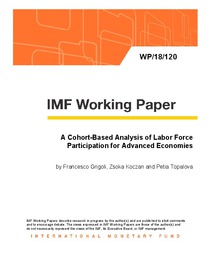A cohort-based analysis of labor force participation for advanced economies
"Advanced economies are in the midst of a major demographic transition, with the number of elderly rising precipitously relative to the working-age population. Yet, despite the acceleration in demographic shifts in the past decade, advanced economies experienced markedly different trajectories...
| Main Authors: | , , |
|---|---|
| Institution: | ETUI-European Trade Union Institute |
| Format: | TEXT |
| Language: | English |
| Published: |
Washington, DC
2018
IMF |
| Subjects: | |
| Online Access: | https://www.labourline.org/KENTIKA-19301697124911298799-a-cohort-based-analysis-of-lab.htm |
| Summary: | "Advanced economies are in the midst of a major demographic transition, with the number of elderly rising precipitously relative to the working-age population. Yet, despite the acceleration in demographic shifts in the past decade, advanced economies experienced markedly different trajectories in overall labor force participation rates and the workforce attachment of men and women. Using a cohort-based model of labor force participation for 17 advanced economies estimated over the 1985-2016 period, we document a significant role of common patterns of participation over the life cycle and shifts in these patterns across generations for aggregate labor supply, especially in the case of women. The entry of new cohorts of women led to upward shifts in the age participation prole, boosting aggregate participation rates. However, this process plateaued in most advanced economies, with signs of reversal in some. Using the model's results to forecast future participation trends, we project sizable declines in aggregate participation rates over the next three decades due to the aging of the population. Illustrative simulations show that implementing policies encouraging labor supply can help attenuate but may not fully offset demographic pressures." |
|---|---|
| Physical Description: | 24 p. Digital |

